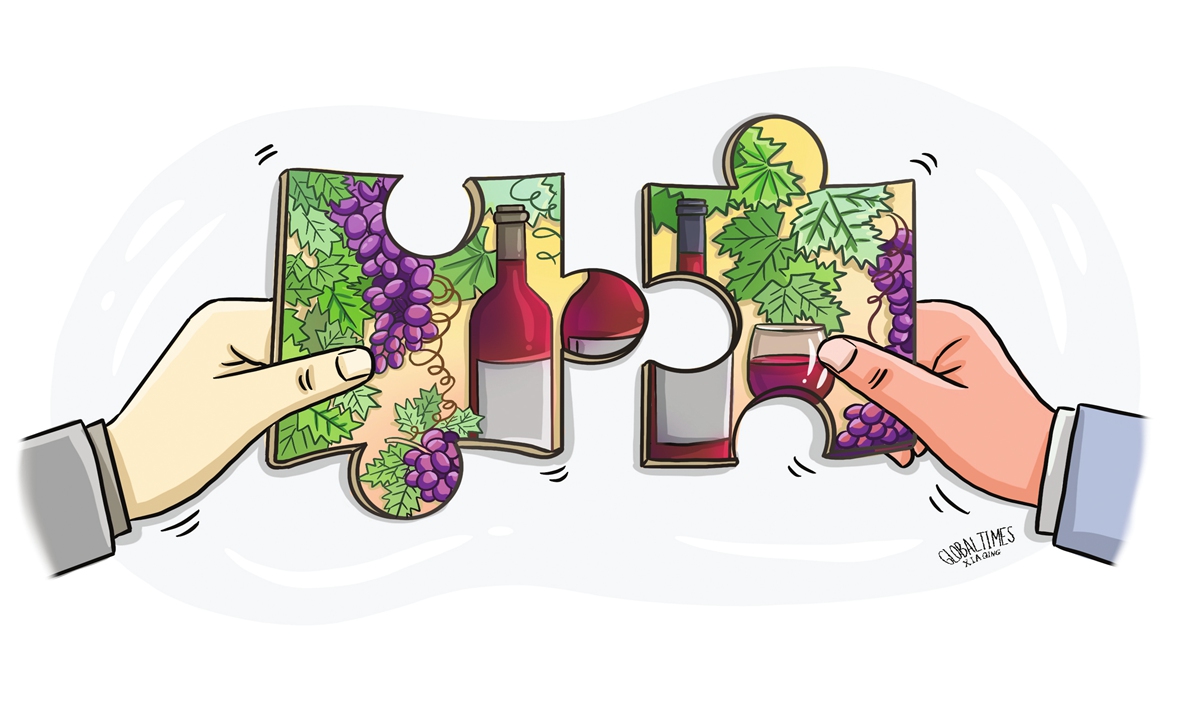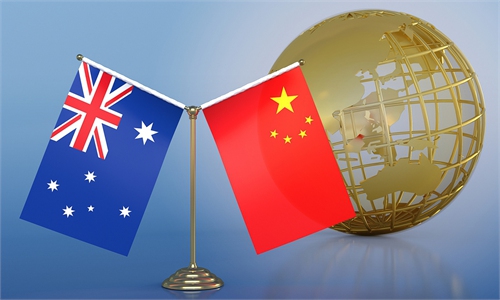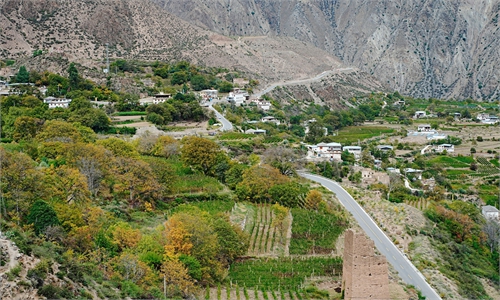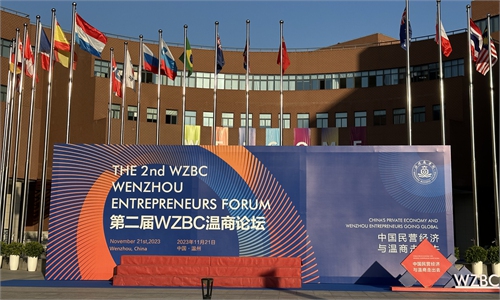
Illustration: Xia Qing/Global Times
China's Ministry of Commerce said last week it would start a review on anti-dumping and anti-subsidy tariffs levied on Australian wine imports.The latest move, following China's earlier dropping of anti-dumping duty on Australian barley and resumption of Australian timber imports, points to further improvement in bilateral relations.
From a deep frost over the past several years to returning to room temperature in this relationship, both countries realize that political bickering and confrontation is in neither side's interests. As two important powers in the Asia-Pacific region, China and Australia are obliged to be on good terms, build up their strategic partnership, and share the responsibility to shore up regional peace, stability and economic prosperity that will benefit all people in the region.
The wine review will be finished within one year, and observers are optimistic that a positive result may come out in the first half of 2024. The introduction in 2021 of up to 200 percent duties on Australian wine prompted trade of Australia wine to China to nosedive.
China "will adjudicate objectively, fairly and openly, based on the claims of each interested party and after examining the evidence," said the Chinese Commerce Ministry on Thursday. By all metrics, breaking the impasse on wine trade will be a big deal for Australian producers, while providing a significant relief to its grape farmers.
While announcing his November China visit, Australian Prime Minister Anthony Albanese said on October 22 that he was hopeful the wine tariff review will lead to the tariffs being dropped. He compared the review to the one launched by the Commerce Ministry earlier this year on Australian barley that resulted in the tariffs being scrapped.
Meanwhile, Australian Grape and Wine CEO Lee Mclean said that he expects the market will start to recover in Australia if China decides to remove the punitive anti-dumping tariffs. Australia had been the biggest foreign player in the Chinese wine market, with annual sales of about $1.1 billion. But the sales plunged to just $10 million last year due to the tariffs. An Australian research report estimates that, currently, there is over 2 billion liters of wine in storage in Australia, or the equivalent of 2.8 billion wine bottles.
As major members of the RCEP - the world's largest free trade zone - China and Australia have long enjoyed closely intertwined trade and economic relations, because their economies are largely complementary and mutually reinforcing too. With the steady thawing in relations since Albanese was elected, both Beijing and Canberra hope that all the problems in bilateral trade, investment and people-to-people exchanges will be resolved. As Albanese said, "We're confident that this [review) will result in, once again, Australian wine, a great product, being able to go to China, free of the tariffs," according to the New York Times.
During the past few years, the two countries were hobbled by intense difficulty in relations when the Australian government, led by Liberal Party leaders, in particular the loose-tongued Scott Morrison, changed Australia's diplomatic course and leaned toward to toeing the lines of the US in relentlessly smearing and demonizing China. Australia had traditionally maintained mostly pragmatic and largely amicable ties with its neighbors, including China. However, the Morrison administration went out of its way to pick fights with China on a flurry of issues, including Hong Kong, Xinjiang, the Taiwan question, as well as South China Sea, and even accusing "Chinese meddling in Australian domestic politics," sending bilateral relations to a deep freeze.
Morrison's China policies were totally misguided. As witnessed by many in Australia, deterioration in bilateral ties has irritated Chinese people and inevitably backfired on Canberra. China is Australia's largest trading partner, accounting for one-third of its annual overseas trade. Any dip in bilateral trade will deeply hurt Australian interests. By the way, Australia was the first country in the world to ban Huawei's advanced 5G equipment, even before the US and the UK, which seriously impacted Chinese public sentiment toward Australia.
For a time, political pollsters and analysts in Australia overseeing the machines of the two major parties, the Liberal and the Labor, acknowledge a fact that the Morrison administration's often harsh rhetoric on China and its penchant for picking a fight with China contributed to his election defeat in 2022, as the majority of the public in Australia are supportive of maintaining a healthy relationship with China.
Since Labor Party came into power, Australia's relations with China have noticeably improved under Prime Minister Albanese's wise management. "I think there are promising signs," Albanese said recently. "We have already seen a number of the impediments to trade between our two nations removed, and a substantial uplift in the trade between our two nations [is seen]."
Since March this year, Australia's exports to China have kept rising, as Chinese buyers are snapping up Australian goods from wool, milk, beef, to coal, liquefied natural gas and iron ore, amid a continuous thaw in relations. As China is now leading the world in the transformative "green revolution" to curb climate change, resource-rich Australia, with abundant supplies of lithium and lithium concentrate, could assist China to churn out the batteries needed for manufacturing electric vehicles. Together, China and Australia could help make Planet Earth a much cleaner and sustainable place to live.
Early last month, Albanese visited Shanghai and Beijing, making him the first Australian prime minister to visit China in seven years. He was warmly received in both cities, and his photos taken at the Echo Wall at the Temple of Heaven of Beijing, a world heritage, were broadly lauded in China. Exactly 50 years ago, late Australian Labor Party prime minister Gough Whitlam visited Beijing, launching formal diplomatic relations between the two countries, and Whitlam's historical photo-taking at the Echo Wall is still remembered by Chinese people.
The Whitlam trip "laid the groundwork for the diplomatic, economic and cultural ties that continue to benefit our countries today," Albanese remarked. Albanese's landmark visit has truly taken Australia's relationship with China a good step forward, as he reiterated that he is committed to navigating differences "wisely and with great respect." In October, Canberra cleared a Chinese company's lease of a port in Darwin, in northern Australia, of security risks - a positive move for the two countries' ties.
Greater understanding and mutual trust will come with more frequent high-level dialogue and consultation and people-to-people visits, and it is important for China and Australia to keep moving forward their strategic partnership relations. Albanese' November China visit should be remembered as setting a new milestone, as the two countries look forward to ushering in the next 50 years of more constructive and friendly cooperation.
The author is an editor with the Global Times. bizopinion@globaltimes.com.cn



